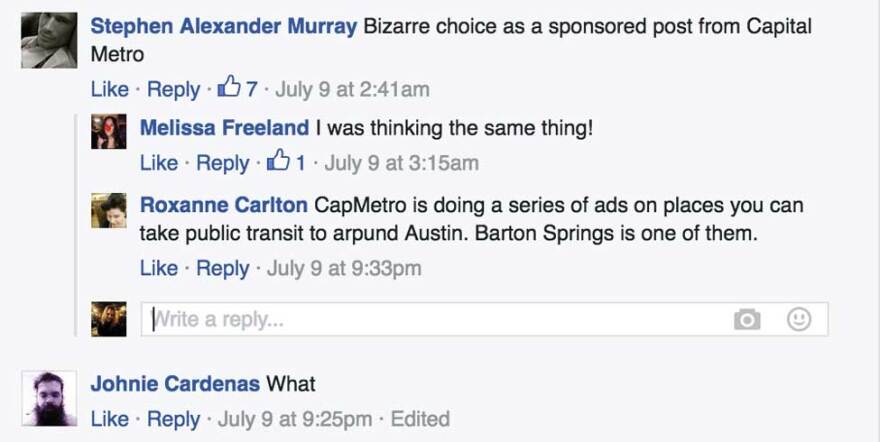In the photo, a curly-haired woman stares into the camera wearing a red lifeguard bathing suit, holding a long, red rectangular flotation device over her shoulder.

“It can be really serious at Barton Springs,” reads the quote that accompanies the picture. “Two years ago, this guy was on drugs and he was swimming and then at some point he blacked out and died. But usually we prevent all of those things from happening. People think that we overreact sometimes. But, you know, your kids are drowning and you didn’t teach them how to swim. They don’t understand how close it can be from a kid going active and splashing around to how quickly they can go underwater and swallow water. I love my job because there needs to be someone that makes sure these kids see tomorrow.”
The photo and quote was posted on the Facebook page of Capital Metropolitan Transportation Authority, or Cap Metro – Austin's public transit provider – as part of a campaign to share "Humans of New York"-inspired stories of Austin transit users.
This particular post and its removal have some people on social media questioning the post's accuracy, along with its appropriateness.
The photo drew criticism for being “insensitive,” “inappropriate,” and “a bizarre choice.” The quote appears to be referencing the drowning of a man at Barton Springs in 2013, the first drowning at the spring-fed pool since 1990. Timothy Guerra, 21, had been swimming with friends when he suddenly went underwater, but it was never reported why Guerra went under, or if he was on drugs. The death was ruled a drowning. A representative with the Parks and Recreation department, which oversees the city's pools and lifeguard staff, says Cap Metro never called to ask permission to post the story or fact check the quote.

But even before the reference to the drowning, the original post also caused confusion because people couldn't figure out why Capital Metro was posting this photo and accompanying text about an issue unrelated to public transit.

Early Monday morning, Cap Metro began responding to the comments on the Facebook post.
“The photo series, the Austin Collective, features Capital Metro's riders and their stories," the transportation authority said via Twitter. "You can see more stories at http://theaustincollective.org," they wrote. Cap Metro has since pulled the photo off its Facebook and Twitter pages in response to the negative feedback.
The Austin Collective project is part of a larger marketing campaign to profile Austin residents who use public transit. According to Cap Metro representatives, photographers and filmmakers gather photos and interview Austin transit users. Then, they shorten the quotes to share on social media. Cap Metro officials say they want to start a dialogue to better understand the people who use Cap Metro. It's a project that's cost the government agency $80,000 so far. Cap Metro Communications Manager Francine Pares said this is just the first phase of the campaign.
“It's proven that people like stories," Pares said. "They want to know about people like themselves."
The first part of the campaign focused on telling the stories of people, and the second phase will help tie in Cap Metro services, she said.
"It's kind of more of an art project, in a way. So that's how we approached it."
"It’s been proven that social media content that are shared the most often are about stories. So we are just following a well-established strategy in engaging people and hoping they’re interested in sharing these stories," Pares said.
"It's kind of more of an art project, in a way," said Amy Peck, the Cap Metro employee who conceptualized the project. "So that's kind of how we approached it."
This particular photo of the lifeguard was posted on the Austin Collective Tumblr page seven months ago, but Cara Welch with the Austin Parks & Recreation Department said the Parks department was unaware of the post until it was promoted on Facebook.
Peck and Pares at Cap Metro insist this was an anecdote voluntarily shared by a participant in the project.
"There was no expectation, I don't think, that this was not easily identifiable or that we needed to fact-check," said Pares. "This was something this person used as an example of why people need to be safe around the water. That’s all it was meant to be...something to illustrate the need for safety around the water. The intent was not to cause emotional distress by someone who may or may not recognize that this was a person they might know. The intent was meant to be illustrative of the need to be safe around water, which is an excellent message, by the way."
To add another layer of confusion, the woman in the photo is also claiming on her Facebook page that she was misquoted.

The woman did not return requests for comment. Cap Metro released her transcript of highlights from the complete interview, but not the fully recorded interview between the photographer and the lifeguard.
"This was a voluntary story that was given to us by a rider," Pares said. "She wanted to tell this story. I can't suppose any intent on that, other when you read her entire transcript, it's about you're really teaching people about water safety. She wanted to be part of this."



